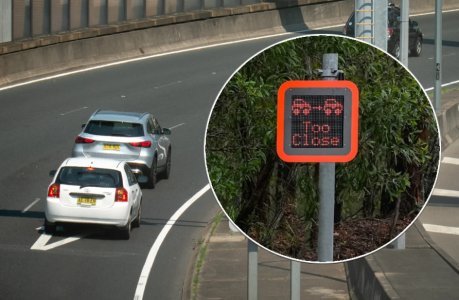New camera trial aims to catch drivers in the act–are you breaking this rule?
By
Maan
- Replies 2
Tailgating has become an alarming issue on local roads, contributing to a rise in rear-end crashes and road trauma.
Now, road authorities are stepping up with a new initiative aimed at curbing this dangerous habit.
The state is testing a high-tech solution that could change the way drivers behave on the road.
Queensland's road authorities introduced a new initiative aimed at addressing the rising problem of tailgating.
The trial involved installing variable message signs on roadsides that warn drivers when they are following too closely to the vehicle in front.
The technology was initially launched at one site, with plans to expand the trial to additional locations in the near future.
The Department of Transport and Main Roads (TMR) described the trial as a 'fact-finding' mission to better understand the extent of tailgating in Queensland.
Although tailgating carries a $376 fine in Queensland, the data from the trial would be used purely to shape future road safety policies, with no plans to issue fines based on the technology.
Recent surveys showed that tailgating is becoming more common, with one in five drivers admitting to the dangerous behaviour.
The RACQ’s Annual Road Safety Survey indicated that 20 per cent of motorists had confessed to tailgating, a trend that has gradually increased in recent years.
Joanna Robinson, general manager of Land, Transport, Safety, and Regulation at TMR, noted the technology’s potential to reduce rear-end crashes, one of the leading causes of road trauma in Queensland.
The real-time alerts from the signs would act similarly to the state’s Slow for SAM (speed awareness monitors), providing feedback based on detected driving behaviour.
According to the Motor Accident Insurance Commission, rear-end crashes are the most frequent type of road accident in Queensland, urging motorists to maintain at least a two-second gap between vehicles, and more in adverse conditions.
Authorities across Australia are increasing efforts to reduce road fatalities by enhancing surveillance and encouraging safer driving behaviours.
Royal Automobile Club of Queensland’s (RACQ) Road Safety and Technical Manager, Joel Tucker, highlighted a rise in aggressive driving tendencies, urging drivers to keep calm and avoid overreacting behind the wheel.
'We all get stuck in traffic, we all have places to be and sometimes we make mistakes. It’s important to keep a cool head and not to overreact to things that happen on the road, because the consequences of impatience or anger can be life-changing,' he said.
In a previous story, we explored how new innovations are transforming road safety.
From cutting-edge technology to smarter infrastructure, the future of driving is changing fast.
You can read more about these game-changing advancements here.

With tailgating becoming a growing concern on our roads, do you think technology like this could make a real difference in driving behaviour? Share your thoughts in the comments.
Now, road authorities are stepping up with a new initiative aimed at curbing this dangerous habit.
The state is testing a high-tech solution that could change the way drivers behave on the road.
Queensland's road authorities introduced a new initiative aimed at addressing the rising problem of tailgating.
The trial involved installing variable message signs on roadsides that warn drivers when they are following too closely to the vehicle in front.
The technology was initially launched at one site, with plans to expand the trial to additional locations in the near future.
The Department of Transport and Main Roads (TMR) described the trial as a 'fact-finding' mission to better understand the extent of tailgating in Queensland.
Although tailgating carries a $376 fine in Queensland, the data from the trial would be used purely to shape future road safety policies, with no plans to issue fines based on the technology.
Recent surveys showed that tailgating is becoming more common, with one in five drivers admitting to the dangerous behaviour.
The RACQ’s Annual Road Safety Survey indicated that 20 per cent of motorists had confessed to tailgating, a trend that has gradually increased in recent years.
Joanna Robinson, general manager of Land, Transport, Safety, and Regulation at TMR, noted the technology’s potential to reduce rear-end crashes, one of the leading causes of road trauma in Queensland.
The real-time alerts from the signs would act similarly to the state’s Slow for SAM (speed awareness monitors), providing feedback based on detected driving behaviour.
According to the Motor Accident Insurance Commission, rear-end crashes are the most frequent type of road accident in Queensland, urging motorists to maintain at least a two-second gap between vehicles, and more in adverse conditions.
Authorities across Australia are increasing efforts to reduce road fatalities by enhancing surveillance and encouraging safer driving behaviours.
Royal Automobile Club of Queensland’s (RACQ) Road Safety and Technical Manager, Joel Tucker, highlighted a rise in aggressive driving tendencies, urging drivers to keep calm and avoid overreacting behind the wheel.
'We all get stuck in traffic, we all have places to be and sometimes we make mistakes. It’s important to keep a cool head and not to overreact to things that happen on the road, because the consequences of impatience or anger can be life-changing,' he said.
In a previous story, we explored how new innovations are transforming road safety.
From cutting-edge technology to smarter infrastructure, the future of driving is changing fast.
You can read more about these game-changing advancements here.
Key Takeaways
- Queensland introduced a trial using technology to warn tailgating drivers with roadside signs.
- The trial aims to gather data to improve road safety policies, not to issue fines.
- Tailgating has become more common, with one in five drivers admitting to the behaviour.
- Experts highlighted the dangers of tailgating, urging drivers to stay calm and maintain safe distances.
With tailgating becoming a growing concern on our roads, do you think technology like this could make a real difference in driving behaviour? Share your thoughts in the comments.








